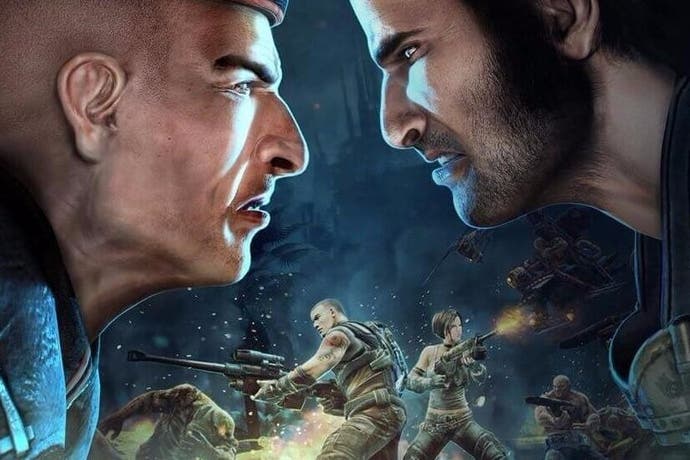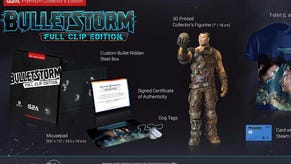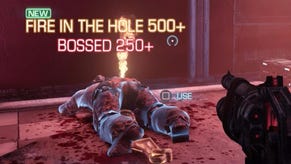Bulletstorm: Full Clip Edition review
Guns n' whammo.
Late last year, when Modern Warfare Remastered was bundled in with Call of Duty Infinite Warfare - so tightly bundled, in fact, that it was clearly an attempt to bolt a hefty booster rocket onto premium sales - it raised the question of what deserves being preserved when it comes to video games. Call of Duty 4: Modern Warfare was hardly in any danger of being lost in the mists of time, right? Its blockbusting original sales and cultural ubiquity ensuring it remained embedded in the minds and muscle memory of at least a generation of gamers.
So what, ideally, should be the purpose of a remaster (putting aside for a moment the fact that assets-jazzed rereleases give developers and publishers the chance to essentially claw back money for old code)? Should it be a curatorial exercise in refreshing established but ageing hits for state-of-the-art hardware - a victory lap, essentially? Or could remasters do more tangible good by offering a second chance to titles that failed to get their due first time round?
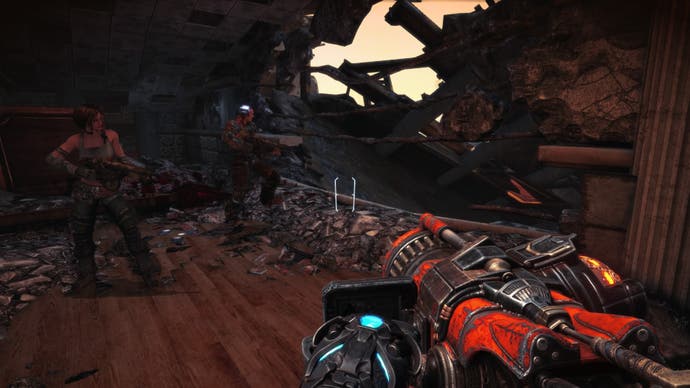
This seems particularly relevant when discussing Bulletstorm: Full Clip Edition, an unexpected but not unwelcome addition to the growing subgenre of deluxe FPS do-overs. The original Bulletstorm came out all guns blazing, literally, from publisher EA in early 2011. The brainchild of Polish developer People Can Fly (at the time majority-owned by Epic Games) it took the chunky imprimatur of the Unreal/Gears of War model and mutated it into something equally and impressively violent but a little more playful. Despite a handful of positive reviews, including a notable 9/10 from one highly respected outlet, Bulletstorm seemed to go off rather half-cocked. It is remembered as a cult curio, the game equivalent of a video nasty.
That's a shame, because Bulletstorm was that rare sci-fi FPS that favoured fun'n'gun over run'n'gun. Taking as much inspiration from Tony Hawk as Marcus Fenix, it coaxed players towards attempting inventive kills (Skillshots, in the game's parlance), combo-ing showboat executions to unlock the points necessary to access covetable upgrades and add-ons. There was a solid, sometimes surprising campaign involving mutton-chopped antihero Grayson Hunt - a former galactic wetworks asset turned beery cosmic freelancer - embarking on a rescue and revenge mission on a ravaged former resort planet filled with Borderlands-ready bad dudes. But the main focus was creating sustained creative carnage, an extemporised process of aggressive elimination performed via whizz-bang weaponry, a multi-purpose energy whip known as a leash and, last but not least, a robust melee attack delivered via Hunt's hefty space boot.
These offensive abilities were clearly designed to be mixed and matched on the hoof: leash a bothersome enemy from afar to yank them, Scorpion-style, across the playspace to point-blank range, then perforate them with a shotgun blast or, alternatively, kick them into a nearby mutant cactus. The fact that both Hunt's leash and melee abilities activated a physics-defying slowdown on the target, granting you a tactical window to line up the perfect points-achieving Skillshot - a rump-targeted bullet spray, say, or kicking your foe into a cloud of explosive insects - proved that the emphasis was on flexibility rather than fidelity. And being able to leash/boot/leash/boot the same enemy like a cruel yo-yo master simply never stopped being entertaining.
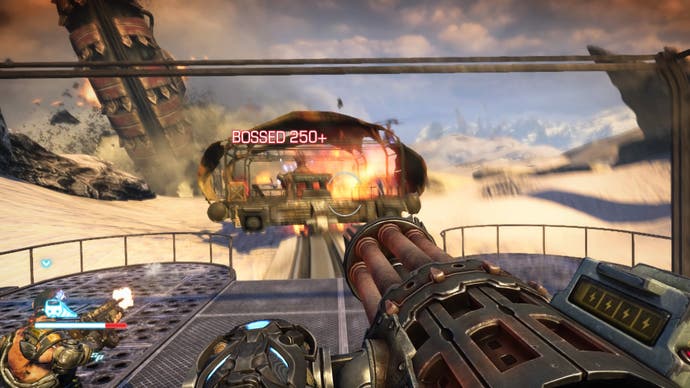
All this good, clean, innately sadistic fun returns in the remaster, overseen by the newly independent People Can Fly and published by FPS experts Gearbox. The brisk campaign mode, which rattles through its blockbuster set-pieces with a welcome momentum, is all present and correct, with Hunt and his temperamental cyborg squadmate Ishi disturbing the eerie post-apocalyptic quiet of the beautifully ruined world of Stygia by steamrollering through its gangs of feral humans and irradiated mutants in search of no-nonsense rival badass Trishka and spittle-spraying evil commandant General Sarrano (so named, you begin to suspect, for his enthusiastically hammy performance). First time round, the campaign drip-drips new weapons and their inventive alt-modes - including a sticky grenade flail and lethal drillbit launcher - throughout its seven acts and restricts you to carrying just three at a time. The Full Clip Edition adds a New Game Plus mode called Overkill which gives you access to your entire arsenal from the outset and, in a nice touch, gifts you unlimited ammo if you unlock every signature Skillshot for a particular weapon.
As well as the cooperative Anarchy multiplayer - see sidebar - the bulk of the original Bulletstorm's replayability came from its Echoes mode, a shoot suite of discrete campaign chunks that chucked all the plot out the window to focus on bare-bones score and time attack. If you ever poured hours into Bizarre Creations's crack-shot third-person shooter The Club, Echoes offered a familiar high: the frantic buzz of speed-running a level, then subsequently working out split-second efficiencies to maximise your score on repeated attempts.
As well as original flavour Echoes, Full Clip Edition adds an Ultimate Echoes mode that tasks you with completing levels three times over with specified loadouts in (often very narrow) time limits before you can upload your best runs to online scoreboards. This does add some variety to the blitzkrieg mix, and forces you to be as adept with your Screamer revolver as your Boneduster shotgun, but with all 30 Echoes levels locked behind challenging progression targets, it's easy to become frustrated when repeatedly falling foul of some of the stricter time restrictions.
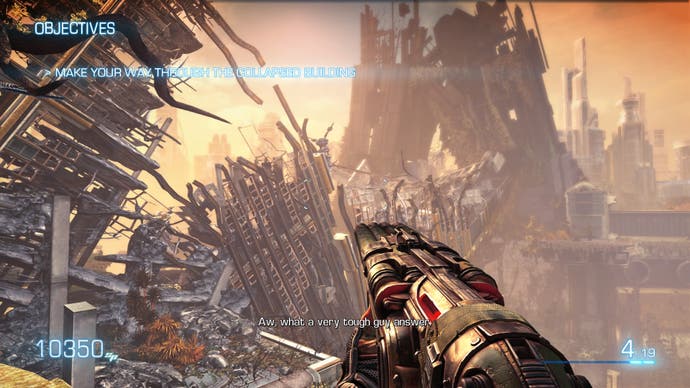
Here's the thing: the Full Clip Edition trumpets the fact that it includes the original Bulletstorm DLC, two expansions called Gun Sonata and Blood Symphony that, as well as some additional multiplayer maps, folded in additional Echoes scenarios. Other repackaged rereleases like Mortal Kombat XL give you access to all their DLC from the outset, so it feels like a bit of a drag when Bulletstorm forces you to jump - and slide, and maim, and shotgun - through demanding hoops before you can even see everything it has to offer. For a game so obviously predicated on fun, it's genuinely jarring to suddenly feel so hemmed in.
In terms of overall presentation, though, Bulletstorm: Full Clip Edition feels like a genuinely luxury package, with a noticeable graphical upgrade that includes 4K options on PS4 and PC. It might be remembered as a disreputable B-movie, but beyond the schoolyard swearing and cartoon ultraviolence, Bulletstorm always seemed to harbour some triple-A ambitions: Michal Cielecki and Krzysztof Wierzynkiewicz's heroic score is comparable to anything Uncharted has to offer, and the whistlestop tour of Stygia offers up some breathtaking picture-postcard vistas of impressive mountain ranges, radiant sunsets and shimmering waterfalls. It all helps make Bulletstorm's world a genuinely enjoyable place to revisit.
Of all the tweaks, polishes and expansions of the Full Clip Edition, perhaps the strangest is Duke Nukem's Bulletstorm Tour - available as a pre-order bonus in the US and day one edition content in the UK - a revamped campaign mode that replaces Hunt with the legendary gun-toting flat-top. This isn't just a model reskin, with original Duke Nukem voice actor Jon St John rerecording dialogue. While offering a third variation of the campaign - on top of the original and Overkill - might be overestimating the average player's appetite for playthroughs, it does add to the sense that considerable effort has been made to make this the very best version of Bulletstorm we are ever going to get. (And considering the original game included much talk of "murder boners", the addition of the imaginatively foul-mouthed Duke is not perhaps as incongruous as it might seem at first glance.)
So it all comes back to that original question: what is the ideal purpose of a remaster? In this case, it certainly does represent a second chance for Bulletstorm to be recognised and applauded for its innovations, and there's a genuine thrill to getting to grips once again with the renegade blaster. Some may cringe at its premium price tag and schoolyard humour, but People Can Fly has crammed in as much added value as possible. And if it belatedly creates an appetite for Bulletstorm 2, then it will inarguably have been worth it.
